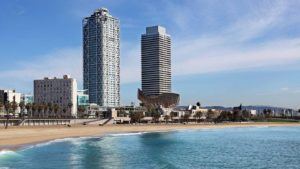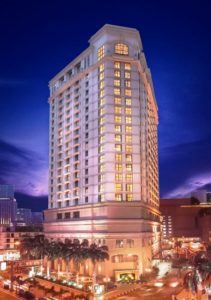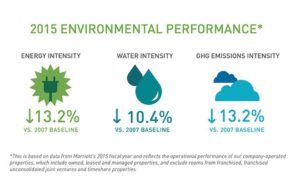Time for Marriott to ‘Check-in’ to Climate Change

Climate change has the potential to destroy Marriott International’s business as we know it. From its resorts nestled along the beautiful white sandy beaches of the Caribbean to its majestic mountain ski lodges, Marriott is profitable when weather is stable and predictable, infectious diseases are kept in check, and traveler disruption is kept at a minimum. With Marriott’s recent $13 billion acquisition of Starwood Hotels, can the world’s largest hotel company rise to the occasion and curtail the effects of climate change?
What climate change means for Marriott
Science has spoken: there is no longer any reasonable doubt – or at least there shouldn’t be – regarding the formidability of climate change. For Marriott, which features more than 1.1 million rooms in over 110 countries, climate change means extreme, unpredictable weather, decreasing snow cover, and rising sea levels at its global properties – all of which yield decreased profitability.[1] In fact, a study from Cornell University calculates losses from weather-related events to have increased by an average of 2% annually for the past 40 years.[2]
Environmental impact drives profitability
The extreme weather conditions are potentially devastating for Marriott, its customers, and the local community, including enhanced risk of flooding, drought, severe storms, heat waves, and infectious disease proliferation. These unpredictable, extreme weather events result in decreased revenue as guests will be displaced or even require a complete property shutdown. For example, during 2011-2012 revenues dropped 15% at its ski resort properties due to lack of snow.[3]
Furthermore, the Caribbean development report estimates that the cost to replace a hotel that has been damaged by a rising sea levels ranges from $9-80 million, not including costs associated with business interruption.[4] Naturally, insurance premiums are also expected to rise with the additional risks that climate change causes. With rising insurance premiums, Marriott’s bottom-line will shrink.
Consumer preferences drive satisfaction
Customers are also weighing in on the debate of climate change, making purchase decisions based on a hotel’s sustainability practices. Numerous studies of the hotel industry show that commitment to environmental practices improves a hotel’s profitability.[5] Marriott, however, recognizes that although consumers value its sustainable efforts, overall service quality should not diminish.
Regulatory impact
The hospitality industry counts for between 4-6% of greenhouse gas emissions with forecasts expected to increase to 10% by 2025. Research from the University of Cambridge indicates that in response, governments are likely to consider carbon taxes to curtail greenhouse gas emissions.[6]
Marriott’s sustainability efforts
Recognizing the threat of climate change, Marriott established its global sustainability program in 2007. Through its sustainability practices as outlined below, Marriott aspires to be the global hospitality leader for environmental sustainability. [7]
- Reducing energy and water consumption 20% by 2020 (2007 baseline)
- Linen and bedding reuse program, energy savings program, keycard management
- Increasing footprint of “green” hotel development
- Marriott has developed a LEED (Leadership in Energy and Environmental Design) prototype program.
- As of YE 2015, Marriott had 142 LEED certified hotels within its portfolio
- Greening its supply chain:
- Marriott has made sustainability a top priority in vendor selection. For example, Marriott has partnered up with FutureFish, a sustainable seafood program, to avoid serving over-fished species.
- Investing in education of associates, guests, and partners
To date, the culmination of Marriott’s sustainability efforts has led to decreased energy intensity of 13.2%, water intensity of 10.4%, and GHG emissions intensity of 13.2% compared to a 2007 baseline. [8]
Additional opportunities for Marriott
While Marriott has made considerable efforts in response to the challenges posed by climate change, the company’s work is not yet done. Not even close. The following identifies areas Marriott should consider going forward:
- Focus on integration – With the Starwood merger complete, Marriott’s umbrella now spans across 30 brands, each with its own sustainability initiatives. Marriott can benefit by leveraging Starwood’s innovative solutions (e.g., Element brand), but must also ensure alignment across portfolio.
- Enhance sustainable prototype – With less than 4% of its portfolio LEED certified, Marriott should consider re-evaluating its existing prototypes or offering enhanced incentives to developers for achieving LEED certification. These incentives should come in the form of reduced franchise fees, access to financing, or key money.[9]
- Expansion of energy savings programs – Marriott should expand its program globally. By partnering with Siemens, Marriott has reduced energy costs at 20 hotels in Europe by 15% and CO2 emissions by 15%, resulting in $1 million of annual savings. [10]
- Improve sustainability education – Virtual reality is the next new travel trend. Marriott can capitalize by showing its customers and employees the negative effects of climate change through VR immersion.
Marriott was an industry pioneer in 2007 when it established its global sustainability initiatives. While Marriott recognizes that the threat of climate change is real, it must continue to develop innovative solutions and remain committed to stay ahead of the curve.
(800 Words)
Sources
[1] Hofmann, M. A. (April 9, 2007). RMS links weather losses, climate change. Business Insurance, 41(15), 20.
[2] Peiró-Signes, A., Segarra-Oña, M., Verma, R., Mondéjar-Jiménez, J., & Vargas-Vargas, M. (2014). The impact of environmental certification on hotel guest ratings. Cornell Hospitality Quarterly, 55(1), 40-51. 04 Nov. 2016, http://scholarship.sha.cornell.edu/articles/376/
[3]“Physical Risks from Climate Change: A Guide for Companies and Investors on Disclosure and Management of Climate Impacts.” www.calvert.com. David Gardiner & Associates, LLC, n.d. Web. 4 Nov. 2016. <http://www.calvert.com/NRC/literature/documents/sr_Physical-Risks-from-Climate-Change.pdf>.
[4] Sookram, Sandra. “The Impact of Climate Change on the Tourism Sector in Selected Caribbean Countries.” Caribbean Development Report 2 (2007): Http://www.cepal.org/publicaciones/xml/3/38253/LCARL.245part4.pdf. Web. 4 Nov. 2016.
[5] Zhang, J. J., N. Joglekar, and R. Verma. 2012c. Pushing the frontier of sustainable service operations management: Evidence from US hospitality industry. Journal of Service Management 23 (3): 377-99.
[6] “Climate change threatens ski and beach resorts, reefs an (n.d.): n. pag. University of Cambridge Institute for Sustainability Leadership. Web. 4 Nov. 2016. <http://www.cisl.cam.ac.uk>.
[7] “Environmental & Green Initiatives | Marriott Corporate Responsibility.” www.marriott.com. Marriott International, n.d. Web. 04 Nov. 2016.
[8] “2015 Update on Environmental Performance.” Marriott.com. N.p., n.d. Web. 4 Nov. 2016. <http://www.marriott.com/Multimedia/PDF/CorporateResponsibility/2015_Reports/2015_EnvironmentalPerformance.pdf>.
[9] Rodriguez, By Natalie. “For Hotel Deals, ‘Key Money’ Is Back In Play – Law360.” For Hotel Deals, ‘Key Money’ Is Back In Play – Law360. Law 360, n.d. Web. 04 Nov. 2016. <http://www.law360.com/articles/472200/for-hotel-deals-key-money-is-back-in-play>.
[10] “Energy Efficiency Program for Marriott Europe.” Siemens.com. N.p., n.d. Web. 4 Nov. 2016. <https://www.downloads.siemens.com/download-center/Download.aspx?pos=download&fct=getasset&id1=A6V10588544>.








Eric, great piece! I expected most of Marriott’s sustainability initiatives, but I was positively surprised by the use of virtual reality to improve sustainability education. Is Marriott already using it or still an idea? If successful, I truly believe there is big potential to roll out to other customer facing industries.
Another comment, the PE fund I used to work for was invested in an industrial laundry company. Customers included hotels, hospitals, etc. and we made big efforts to have best in class water management practices. I think there is opportunity for large hotel chains like Marriott to push for environmentally friendly practices in all their other vendors.
Really interesting article! As a consultant traveling a lot from hotel to hotel, I do think that SPG and Marriott are doing a better job in providing environmentally friendly accommodation and service compared with other competitors around the world. I especially like your idea of Marriott leverage SPG’s innovative solutions after their merge. Besides the Element brand, SPG has also developed interesting and reliable digital techniques, i.e. keyless check-in with SPG mobile APP, to improve their energy saving results. Imagine one day there won’t be a physical hotel room key made of plastics and metal chips – how much GHG emissions could we reduce!
Very interesting piece, Eric! I think Marriott’s efforts to date on reducing the impact its operations have on the environment and encouraging its guests and employees to act more “green” are commendable. Marriott is really taking advantage of its scale and infrastructure to communicate not only its role as a company, but also its guest’s role in combating climate change. Do you know how Marriott benchmarks against others in the industry?
Also, I thought it was particularly interesting to think about not only how Marriott is implementing sustainability efforts, but also how climate change has the potential to negatively impact its business. I noticed that you outlined many ways the business may by affected (extreme weather, etc. leading to declining revenues) but I didn’t see much on how Marriott is responding to these threats other than in relation to what Marriott is doing in its own sustainability efforts. How can Marriott better prepare itself for potential disruptions? For instance, with less snow cover affecting traffic at its ski locations, Is Marriott partnering with company’s such as Vail Associates to work on potential mitigants such as artificial snow? Also, did that trend you observed in 2011-2012 continue? It seemed like a rather large one-time drop.
Very interesting article! I didn’t realize that Marriott is a pioneer in sustainable practices. I agree with you that sustainability factors into consumer’s purchase decisions, especially millennials, so Marriott’s PR team should do a better job of getting the word out! In the beginning of the article you mentioned that revenues at ski resorts were down about 15% LY because of lack of snow. Especially now that Marriott’s portfolio of hotels has grown to include brands under Starwood, do you think that Marriott should move to close down some of its locations? One could argue that empty rooms are a big drag on the environment.
Debatably, climate change can increase revenues of Marriott’s hotels (especially the beach resorts) by driving more customers. It is true that climate change means sudden changes in weather, but it also means extended summer periods on average. You mentioned drop in ski resorts revenues – it would also be interesting to see the impact on beach resorts revenues.
Nevertheless, I totally agree with your proposed areas to further improve sustainability (the VR one is very interesting!). It is true that Starwood has already several practices in place that Marriott can leverage. In fact, Starwood has a large sustainability program where the customer can “Make a Green Choice” in return for loyalty points (implying decisions on bed sheets changing frequency, towels changing frequency, keyless access, etc.)
link: http://www.starwoodhotels.com/corporate/about/citizenship/sustainability/programs.html?language=en_US
Very interesting article, Eric! I didn’t know about all the efforts Marriott is making towards turning into a more environmental conscious company.
One of the efforts you mentioned Marriott is making is investing in education of associates, guests, and partners. Unfortunately, educating people does not always translate into them actually taking measures – many people need incentives in order to change their current behavior.
In a comment above it was mentioned that Starwood has a large sustainability program for its customers that allows them to earn more loyalty points (a big incentive for many guests). I am wondering what could be the incentives for Marriott’s employees to further develop into more sustainable practices (less use of water or light among others). Maybe Marriott could offer them extra days of vacation, bonuses or free nights. I am sure these and other ideas would make them more committed towards Marriot’s goal of turning into a more environmental conscious company.
Eric, I’m glad to see that Marriott seems to be aware of the climate change issue and has begun to take steps to try to mitigate. I wonder about the impact that will be possible by focusing on internal operations only, so the VR integration that you suggested sounds very promising. If Marriott’s sustainability practices can somehow “rub-off” on its customers and they apply them at home, where they spend many million more nights, the impact could be huge! Thanks for the thought-provoking piece.
Great post, Eric! Like you, I believe that Marriott is doing a tremendous job in becoming a more sustainable and responsible company when it comes to its carbon footprint. One thing to consider is the constant friction between Marriott and its owners. One of your recommendations you provided was:
“Enhance sustainable prototype – With less than 4% of its portfolio LEED certified, Marriott should consider re-evaluating its existing prototypes or offering enhanced incentives to developers for achieving LEED certification. These incentives should come in the form of reduced franchise fees, access to financing, or key money”
My one concern with this is convincing owners that this is the best option for them. Unfortunately, most owners are only concerned with one thing, returns. LEED certified construction in the hotel industry costs 8%-12% more than traditional construction. I worry that Marriott will have a very hard time convincing owners to take this additional step. Furthermore, Marriott incentivizing owners to take measures to build LEED certified properties (i.e. more key money, lower franchise fees) seems impractical and could be a tough sale to shareholders and the Board. Financially, I could see it getting to the point where something has to give. I believe that unless regulated by the government, LEED certified construction or rehab might not be at the forefront of the owner’s or Marriott’s mind.
Eric, I thought I was interesting because Marriott has actual practical incentive for maintaining health of climate and environment, since it isa huge hotel chain which values the sights and environment for its business. It is also noteworthy that you pointed out the economical scale of this mega hotel chain. I learned a lot, Thank you!
What a well structured and well thought out post. Of all the industries covered, I think Marriott definitely has one of the strongest direct incentives to start reducing its environmental impact.
I’m shocked to hear that only 4% of Marriott’s properties are LEED certified. That seems like a huge opportunity, and one that’s right in front of Marriott. It seems that for each hotel refurbishment that will occur as a natural course of business, it would only be a relatively minor incremental cost to make sure that hotels become LEED certified.
I love that you’re thinking outside the box with virtual reality — I never would have thought of that! I imagine that if Marriott feels that VR is truly the wave of the future, then investing in VR would make a lot of sense. I imagine its similar to how Kodak should have invested heavily into digital photography rather than watch its business become the way of the past.
Brian-
It is interesting you bring up the LEED certification process. See my above comment for more info but the problem becomes Marriott as a management company trying to convince owners/investors to take the extra cost of building or rehabbing properties to be LEED certified. This is a huge undertaking as it costs 8%-12% more in construction to fit the LEED criteria.
Thanks for a great article Eric! I’m glad that Marriott has taken on some very ambitious goals, such as reducing energy and water consumption by 20% by 2020. Also, I’m interested in their LEED prototype, which is definitely a step in the right direction. One thing to keep in mind is that hotel companies are constantly refreshing their current estates, with renovations required every 5 – 10 years. As part of these renovations, Marriott could mandate incorporating LEED improvements in energy usage. In that way, Marriott would not have to wait to build new hotels to have an increasingly green portfolio. Also, at InterContinental Hotels Group we gave our hotels a technology system called IHG Green Engage which gave hotel owners transparency into their energy usage and best practices in reducing waste. Hotel-level visibility should be key to Marriott’s education efforts.
Eric, thanks for a very insightful post. I think this is a great opportunity for Marriott to step up their sustainability practices with the acquisition of Starwood and the corresponding increase in their global footprint. I really liked your idea about pushing for more LEED certified hotels through financial incentives and while this may be difficult for existing hotels, it could be possible for new hotels or hotels undergoing major renovations. I also fully agree with Wiss and Cristina that the “Make a Green Choice” program should be expanded since it aligns the customer’s incentives with that of Marriott and I believe it is far more effective than just educational material in hotel rooms. I also wonder if Marriott could partner with local non-profits in their vacation properties to educate guests on how climate change has impacted the local area and they could conduct tours for visitors to see it first-hand.
Great article, Eric! As an ex-consultant, I have seen many hotels invest in “greener” efforts, such as what Marriott is doing with its bedding/linen, and I think these programs are great.
You mentioned the decrease in revenue for Marriott’s hotels that are on ski resorts due to the effects of climate change. I wonder if this decrease substantially affected Marriott’s bottom line. I can understand a potential traveller would decide against traveling to a ski resort because of the lack of snow, but would that same traveller decide against taking a trip at all? In other words, I would be curious to know if the decrease in revenue at these ski resort locations were balanced by an increase in revenue at other (warmer) locations in the world. I think the answer to this question would help Marriott decide on where to open and close properties to make sure they are profitable in the long run.
Hey Eric,
You wrote a wonderful section on the sustainable spaces into which Marriott can grow in the future. I appreciated how you provided specific, actionable steps for Marriott to take. The fact that Starwood has undertaken its own set of innovative solutions would certainly be an opportunity for Marriott to leverage in order to diversify its own sustainability portfolio. VR immersion could be a cool advertising concept for Marriott to undertake not only for an educational reason but also to attract customers to its hotels. Many people want to decrease their carbon footprint but are not sure how to, so incorporating sustainability into their travels (and then feeling like they are doing something good for the planet) would likely be a draw for many Marriott hotel guests.
Great work!